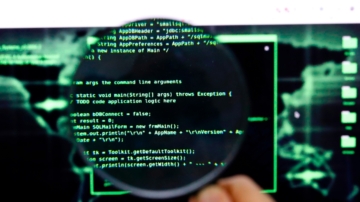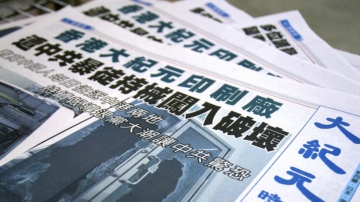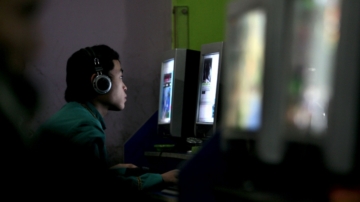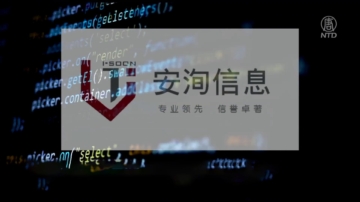【新唐人2013年03月09日訊】中國最大的微博營運商《新浪》微博,目前已達5億用戶,每天發出上億條貼子。最近,美國媒體揭露新浪「刪帖」的內幕說:30%的帖子在發出5-30分鐘內就被刪除。為甚麼新浪微博「刪帖」如此神速?誰在控制這個大機器﹖請看以下這則報導。
美國德州休斯頓市的「萊斯大學」計算機系教授沃勒克,和他的同事們,在《新浪》微博收集了數百萬帖子,併進一步分析和識別審查員的規模和刪貼速度。他們把研究成果,發表在「麻省理工學院」的《MIT技術評論》雜誌上。
研究人員把目光鎖定在3,500多名曾經遭到刪帖的用戶帳號上,從去年7月20號到9月8號,對這些帳號進行了15天的跟蹤觀察。他們發現,這些用戶每天約有4,500個帖子被刪,佔總髮帖量的12%﹔其中,「5%的刪帖」在微博發出後8分鐘內完成,「30%的刪帖」在30分鐘內完成,「90%的刪帖」在24小時內完成。
被刪除的微博會顯示「此微博不適宜對外公開」,而被用戶自行刪除的則顯示「該帖不存在」。有些貼子在發出的5-10分鐘內被刪,這表示微博管理員的審查時間「幾乎是實時進行」。
網友「秀才江湖」指出,刪貼不成,還可以封微博帳號,或者直接刪除帳號。網友「秀才江湖」:「我的號經常被封,在開兩會了,十八大了,就怕我說了甚麼不愛聽的話,就把我的號封了。不讓人家在網上說,人家就到街上去表達。今天『滿屏儘是轉世黨』,明天就會『滿城盡帶黃金甲』。不讓人說,就用行動來表達。」
中國獨立記者、自由作家昝愛宗也多次被《新浪》刪號。他指出,《新浪》刪除用戶的帳號,從來都不通知一聲,直接刪除,而且還多次刪,目地就是不讓人說話。
中國獨立記者、自由作家昝愛宗:「新浪非常無恥,國家在做它的後臺,所以它才肆無忌憚,如果沒有這個國家後臺,它早就關掉了,或者是它要接受處罰,比如說,封號,你封用戶的號,用戶要求你賠償,一個用戶要求賠償一、兩萬的損失,如果有一億用戶來要求它賠償,那不得把新浪賠死。」
據報導,北京建立了「黨組織」的重點網站共9家:《百度》、《新浪》及《第一視頻》等都成立了「黨委」,北京地區26家主要網站中,《百度》和《新浪》是互聯網企業中「黨組織」建設的先行者。
北京維權人士李金成指出,《新浪》在各地都設有黨支部,網絡刪貼早被中共當局做為政治任務來抓了。
北京維權人士李金成:「只要是你力挺政府的,可以保留,但是你對政府批評的,或者是你披露外界不怎麼知道的消息,所謂的敏感信息,它馬上刪掉,它們對重點人員進行監控。」
《新浪》微博用戶眾多,平均每分鐘有7萬個新帖子。研究人員估算,《新浪》一個審查員如果每分鐘閱讀50個帖子,那麼掃瞄每分鐘湧入的7萬帖子,需要有1400人同時工作,假設他們每天工作8小時,就需要有4200人才能滿足審查需要。
那麼《新浪》是如何做到迅速發現並刪除敏感帖子?
研究人員推測,微博的審查系統,通過運用人手和軟件監控,套用能啟動不同審查程序的多個封鎖關鍵詞列表,搜索過濾系統等,變成一個極度複雜的系統進行刪貼。
而昝愛宗指出,《新浪》是個龐大的公司,各地都有辦事處,公司招聘的管理人員不少於3萬名。光微博這塊,就有一個龐大的隊伍來監控管理,現在維穩是中共政權的第一任務,所以當局就不擇手段的來刪貼、封號。
採訪編輯/李韻 後製/孫寧
Sina Weibo Rapidly Deleting Microblogs
Sina Weibo, China's largest microblogging
operator, currently has 500 million users.
It issues hundreds of millions of daily postings.
Recently, U.S. media exposed the inside
story of rapid deletion of Sina Weibo postings.
It reported that 30% of posts would
be deleted within 5-30 minutes.
How can Sina delete posts so rapidly?
Who is in control of this big machine?
Dan Wallach, Professor of Computer Science
at Rice University, along with colleagues,
collected millions of posts from Sina.
After further analysis and identification of
deletion and posting, they published their
results in the MIT Technology Review
The research focused on 3,500 user accounts, with
posts deleted between July 20 to September 8, 2012.
15 days of tracking observation
showed 4,500 posts were deleted.
That accounts for 12% of the total postings.
5% were deleted within 8 minutes of posting, 30%
within 30 minutes, and 90% were within 24 hours.
After deletion, the website showed the
warning, “microblog unfit for public viewing.”
When posts were deleted by users themselves,
the website would show “post does not exist.”
Some posts were deleted within 5-10 minutes,
showing the censorship is almost simultaneous.
One web user pointed out that if deletion fails,
they can also close or delete your account:
“My number was often blocked during
the two sessions, or the 18th Congress.
They were afraid that I said something
unpleasant, so they closed my account.
If they forbid others to express themselves
online, people can go on to the streets to talk.
When freedom of speech has been taken away,
people can express themselves in actions.”
Zan Aizong, an independent reporter and freelance writer,
whose account has been deleted often by Sina, says
that Sina deletes users' account, without informing them.
Sina does it directly, and often
repeatedly to stop you from talking.
Zan Aizong: “Sina is very shameless. The
regime is supporting it, so it can be very blatant.
Without the backing of the regime, it would
have been shut down or paid a severe penalty.
For example, if you close users'
accounts, they will ask for compensation.
If everyone asks for 10-20,000
yuan, Sina will be broke soon.”
It is reported that Beijing has established
nine “party organization” focus websites.
"Baidu", "Sina" and "First Video"
all have party committees.
Among the 26 websites in the Beijing region, Baidu and
Sina Weibo are pioneers for “setting up party organizations.”
Beijing human rights activist Li Jincheng points out
that "Sina" has party branches all over the country.
Deletion of postings is a political
task for the Party officials.
Li Jincheng: “As long as you are behind the
government, you can keep your postings.
If you criticize the government, or disclose
something to the outside world, the so-called
『sensitive information', it is immediately deleted.
They are monitoring key personalities.”
Sina Weibo has many users, and an
average of 70,000 new posts every minute.
Researchers estimate that a Sina censorship
inspector reads 50 blogs per minute.
It would need 1400 people to scan 70,000 posts.
If staff work 8 hours per day, a total of 4200
people would be required to meet reviewing needs.
How does Sina delete sensitive postings so quickly?
Researchers speculate that it is
being done by a review system.
Using manpower and software, lists of keywords, and
search filter systems, a complex deletion system is created.
Zan Aizong points out that Sina is a huge
company, with branch offices everywhere.
It recruits more than 30,000 managers, and there
is a large team for monitoring microblogs alone.
When maintaining stability is the regime's first task,
authorities will be unscrupulous with deletion of postings.
美國德州休斯頓市的「萊斯大學」計算機系教授沃勒克,和他的同事們,在《新浪》微博收集了數百萬帖子,併進一步分析和識別審查員的規模和刪貼速度。他們把研究成果,發表在「麻省理工學院」的《MIT技術評論》雜誌上。
研究人員把目光鎖定在3,500多名曾經遭到刪帖的用戶帳號上,從去年7月20號到9月8號,對這些帳號進行了15天的跟蹤觀察。他們發現,這些用戶每天約有4,500個帖子被刪,佔總髮帖量的12%﹔其中,「5%的刪帖」在微博發出後8分鐘內完成,「30%的刪帖」在30分鐘內完成,「90%的刪帖」在24小時內完成。
被刪除的微博會顯示「此微博不適宜對外公開」,而被用戶自行刪除的則顯示「該帖不存在」。有些貼子在發出的5-10分鐘內被刪,這表示微博管理員的審查時間「幾乎是實時進行」。
網友「秀才江湖」指出,刪貼不成,還可以封微博帳號,或者直接刪除帳號。網友「秀才江湖」:「我的號經常被封,在開兩會了,十八大了,就怕我說了甚麼不愛聽的話,就把我的號封了。不讓人家在網上說,人家就到街上去表達。今天『滿屏儘是轉世黨』,明天就會『滿城盡帶黃金甲』。不讓人說,就用行動來表達。」
中國獨立記者、自由作家昝愛宗也多次被《新浪》刪號。他指出,《新浪》刪除用戶的帳號,從來都不通知一聲,直接刪除,而且還多次刪,目地就是不讓人說話。
中國獨立記者、自由作家昝愛宗:「新浪非常無恥,國家在做它的後臺,所以它才肆無忌憚,如果沒有這個國家後臺,它早就關掉了,或者是它要接受處罰,比如說,封號,你封用戶的號,用戶要求你賠償,一個用戶要求賠償一、兩萬的損失,如果有一億用戶來要求它賠償,那不得把新浪賠死。」
據報導,北京建立了「黨組織」的重點網站共9家:《百度》、《新浪》及《第一視頻》等都成立了「黨委」,北京地區26家主要網站中,《百度》和《新浪》是互聯網企業中「黨組織」建設的先行者。
北京維權人士李金成指出,《新浪》在各地都設有黨支部,網絡刪貼早被中共當局做為政治任務來抓了。
北京維權人士李金成:「只要是你力挺政府的,可以保留,但是你對政府批評的,或者是你披露外界不怎麼知道的消息,所謂的敏感信息,它馬上刪掉,它們對重點人員進行監控。」
《新浪》微博用戶眾多,平均每分鐘有7萬個新帖子。研究人員估算,《新浪》一個審查員如果每分鐘閱讀50個帖子,那麼掃瞄每分鐘湧入的7萬帖子,需要有1400人同時工作,假設他們每天工作8小時,就需要有4200人才能滿足審查需要。
那麼《新浪》是如何做到迅速發現並刪除敏感帖子?
研究人員推測,微博的審查系統,通過運用人手和軟件監控,套用能啟動不同審查程序的多個封鎖關鍵詞列表,搜索過濾系統等,變成一個極度複雜的系統進行刪貼。
而昝愛宗指出,《新浪》是個龐大的公司,各地都有辦事處,公司招聘的管理人員不少於3萬名。光微博這塊,就有一個龐大的隊伍來監控管理,現在維穩是中共政權的第一任務,所以當局就不擇手段的來刪貼、封號。
採訪編輯/李韻 後製/孫寧
Sina Weibo Rapidly Deleting Microblogs
Sina Weibo, China's largest microblogging
operator, currently has 500 million users.
It issues hundreds of millions of daily postings.
Recently, U.S. media exposed the inside
story of rapid deletion of Sina Weibo postings.
It reported that 30% of posts would
be deleted within 5-30 minutes.
How can Sina delete posts so rapidly?
Who is in control of this big machine?
Dan Wallach, Professor of Computer Science
at Rice University, along with colleagues,
collected millions of posts from Sina.
After further analysis and identification of
deletion and posting, they published their
results in the MIT Technology Review
The research focused on 3,500 user accounts, with
posts deleted between July 20 to September 8, 2012.
15 days of tracking observation
showed 4,500 posts were deleted.
That accounts for 12% of the total postings.
5% were deleted within 8 minutes of posting, 30%
within 30 minutes, and 90% were within 24 hours.
After deletion, the website showed the
warning, “microblog unfit for public viewing.”
When posts were deleted by users themselves,
the website would show “post does not exist.”
Some posts were deleted within 5-10 minutes,
showing the censorship is almost simultaneous.
One web user pointed out that if deletion fails,
they can also close or delete your account:
“My number was often blocked during
the two sessions, or the 18th Congress.
They were afraid that I said something
unpleasant, so they closed my account.
If they forbid others to express themselves
online, people can go on to the streets to talk.
When freedom of speech has been taken away,
people can express themselves in actions.”
Zan Aizong, an independent reporter and freelance writer,
whose account has been deleted often by Sina, says
that Sina deletes users' account, without informing them.
Sina does it directly, and often
repeatedly to stop you from talking.
Zan Aizong: “Sina is very shameless. The
regime is supporting it, so it can be very blatant.
Without the backing of the regime, it would
have been shut down or paid a severe penalty.
For example, if you close users'
accounts, they will ask for compensation.
If everyone asks for 10-20,000
yuan, Sina will be broke soon.”
It is reported that Beijing has established
nine “party organization” focus websites.
"Baidu", "Sina" and "First Video"
all have party committees.
Among the 26 websites in the Beijing region, Baidu and
Sina Weibo are pioneers for “setting up party organizations.”
Beijing human rights activist Li Jincheng points out
that "Sina" has party branches all over the country.
Deletion of postings is a political
task for the Party officials.
Li Jincheng: “As long as you are behind the
government, you can keep your postings.
If you criticize the government, or disclose
something to the outside world, the so-called
『sensitive information', it is immediately deleted.
They are monitoring key personalities.”
Sina Weibo has many users, and an
average of 70,000 new posts every minute.
Researchers estimate that a Sina censorship
inspector reads 50 blogs per minute.
It would need 1400 people to scan 70,000 posts.
If staff work 8 hours per day, a total of 4200
people would be required to meet reviewing needs.
How does Sina delete sensitive postings so quickly?
Researchers speculate that it is
being done by a review system.
Using manpower and software, lists of keywords, and
search filter systems, a complex deletion system is created.
Zan Aizong points out that Sina is a huge
company, with branch offices everywhere.
It recruits more than 30,000 managers, and there
is a large team for monitoring microblogs alone.
When maintaining stability is the regime's first task,
authorities will be unscrupulous with deletion of postings.








